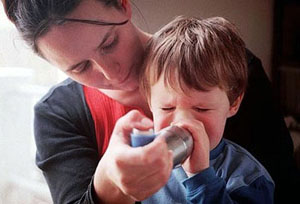 Asthma, also called bronchial asthma, is defined as a chronic inflammatory disorder of the airways, involving various cells particularly mastocyte, eosinophilic granulocyte and T-lymphocyte. It is manifested as paroxysmal wheeze, chest distress and/or cough, which usually occur at night and/or at early morning and may remit spontaneously or by treatment. According to pathogenesis, it may be classified as exogenous asthma and endogenous asthma. The incidence of bronchial asthma is very high, which is a great threat to public health.
Asthma, also called bronchial asthma, is defined as a chronic inflammatory disorder of the airways, involving various cells particularly mastocyte, eosinophilic granulocyte and T-lymphocyte. It is manifested as paroxysmal wheeze, chest distress and/or cough, which usually occur at night and/or at early morning and may remit spontaneously or by treatment. According to pathogenesis, it may be classified as exogenous asthma and endogenous asthma. The incidence of bronchial asthma is very high, which is a great threat to public health.
This disease belongs to the category of "xiao zheng"(wheezing syndrome) in TCM. Its pathogenic factors include endopathic and exopathic aspects. The former refers to congenital defect, kidney qi deficiency and weak constitution, or allergic constitution, or the lung obstructed by long-retained phlegm. The latter is related to invasion by exogenous pathogenic factors, improper diet, emotional disturbance, over strain, etc. Phlegm, as the principal pathogenic factor, accumulates in the lung and becomes an "obstinate root" of this disease. Because of this, an acute attack of disease may be induced by sudden change of climate, aspiraton of allergen, improper diet, emotional disdorder or over strain.
Category of Asthma in TCM
Exogenous asthma
Endogenous asthma